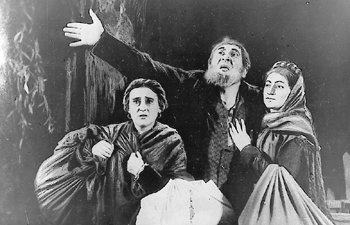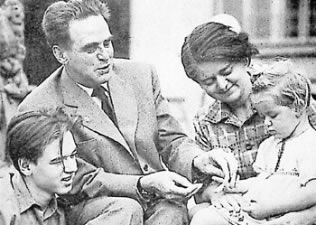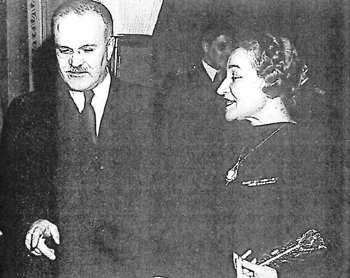Jews in the Soviet
Union from 1941
up to the end of the
Soviet era
(Part 3 of 8)
The Campaign
against "Cosmopolitans" and the "Doctor's Plot"
The years following the victory over Nazi Germany are marked by a wave of Russian nationalism and the anti-Western campaigns of the emerging Cold War. Soviet policy makers, and Stalin in particular, harbor a growing suspicion about the loyalty of Soviet Jews, many of whom have relatives in the United States, now the enemy.
The mysterious murder of Solomon Mikhoels in Minsk on January 13, 1948, is an ominous sign. The same year, an increasing number of articles in the press accuse so-called "rootless cosmopolitans" of "demolishing national pride," "harboring anti-patriotic views" and "fawning on the West." More and more the attacks take on an anti-Jewish character, as most of the attacked bear distinctly Jewish names, often given in brackets next to their Russified names.


At your left, the final scene of "Tevye the Milkman" at the Lvov Jewish State Theater in 1947, just before the theater was closed down as part of the campaign against Jewish culture.
At your right,
the Czech Jewish party leader Rudolf Slansky (seen here with his family) was
found guilty of "Trotskyite-Titoist-Zionist activities in the service of
American imperialism" at a trial in Prague in November 1952. Appeals to
nationalist and anti-Semitic sentiments were frequently used in the 1950s to
discredit the opposition to the newly established communist governments in Eastern
Europe. Slansky and ten others (seven of which were Jews) were executed in December
1952.
From November 1948
onward, the Soviet authorities start a deliberate campaign to liquidate what
is left of Jewish culture. The Jewish Anti-Fascist Committee is dissolved, its
members arrested. Jewish literature is removed from bookshops and libraries,
and the last two Jewish schools are closed. Jewish theaters, choirs and drama
groups, amateur as well as professional, are dissolved. Hundreds of Jewish authors,
artists, actors and journalists are arrested. During the same period, Jews are
systematically dismissed from leading positions in many sectors of society,
from the administration, the army, the press, the universities and the legal
system. Twenty-five of the leading Jewish writers arrested in 1948 are secretly
executed in Lubianka prison in August 1952.

Above, No one was safe from Stalin's anti-Jewish paranoia. Polina Zhemchuzhina, the Jewish wife of Foreign Minister Molotov, was sent to the Gulag as a "Zionist spy" after she had spoken some words in Hebrew at a reception for the Israeli ambassador to the Soviet Union, Golda Meir. She was released after Stalin's death.
The anti-Jewish campaign culminates in the arrest, announced on January 13, 1953, of a group of "Saboteurs-Doctors" accused of being paid agents of Jewish-Zionists organizations" and of planning to poison Soviet leaders. Fears spread in the Jewish community that these arrests and the show trial that is bound to follow will serve as a pretext for the deportation of Jews to Siberia. But on March 5, 1953, Stalin unexpectedly dies. The "Doctor's Plot " is exposed as a fraud, the accused are released, and deportation plans, already discussed in the Politburo, are dropped.